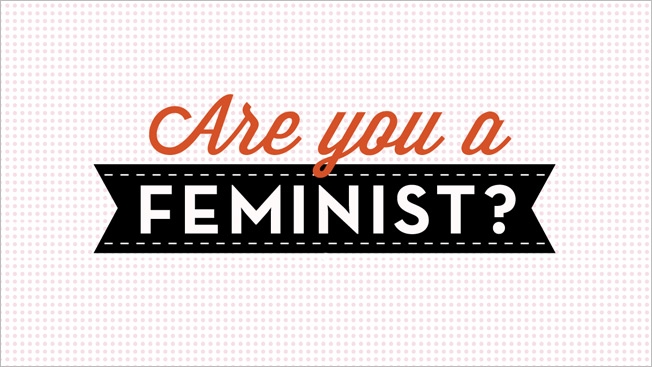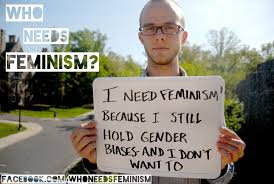 Contrary to the opinions of some feminists, I believe that men do have a role within feminism and that this role is, in fact, not so complicated and need not offend everyone. There are a few things which men need to recognise if they are to supplement the feminist movement. The first is that they – I mean we – are not representatives of female feminists, nor can we ever fully understand or embody the challenges which women face on an everyday basis within society. And we should not pretend to either. That’s not what being a male feminist is about.
Contrary to the opinions of some feminists, I believe that men do have a role within feminism and that this role is, in fact, not so complicated and need not offend everyone. There are a few things which men need to recognise if they are to supplement the feminist movement. The first is that they – I mean we – are not representatives of female feminists, nor can we ever fully understand or embody the challenges which women face on an everyday basis within society. And we should not pretend to either. That’s not what being a male feminist is about.
To be a feminist of any gender is to be someone who wants to fight against the patriarchy, and that’s something which men can support too. If this battle is won at the expense of an identity crisis for men then fine, that’s actually a good thing as men need to reconsider their place in society as one which does not consist of masculine dominance, bravado and the protection of women.
Indeed, this last point on protection is often the dividing line between men who think that they are feminists, and those who actually are effective male feminists. Men who think that they are feminists are often those who stick up for women and women’s rights out of a patriarchal, traditional obligation to protect women. While men may intervene on behalf of women in order to protect them from abuse, the end result is a subtle reinforcement of the patriarchy we already experience – women are still ‘liberated’ and protected by men and at the whims of men.
We can see this in the case of ‘dude feminism’, with campaigns featuring famous faces such as Justin Timberlake condemning abuses towards women in prostitution and sex work. However, the sentiment in these campaigns is often that ‘real’ men don’t buy women, they protect them. And so, instead of being a humanitarian message against attacks on women, it is a patriarchal message against abuse, one which seeks to re-mould men to make them more socially acceptable but, ultimately, still superior to women as their protectors.
That is not how being a male feminist works.
It’s not just about being someone who opposes the patriarchy for the sake of men’s own problems either. Yes, men suffer from the patriarchy too by being forced to conform to macho standards of self-control, strength and power. ‘Effeminate’ or ‘weak’ male identities are opposed and looked down upon. Whether you are ‘nerdy’, skinny or overweight, a fan of the colour pink, or a member of a sexual minority, you, as a man, are oppressed by the patriarchy for failing to be a sporty or wealthy, powerful, straight male leader.

Men are oppressed by the patriarchy too, but to a far lesser extent. Their relief is not the first aim of feminism.
These issues of gendering and masculinity are real issues, but they are a side problem within feminism, not its primary goal. The issues of masculinity will be solved by feminists in their efforts against the patriarchy, but their primary aim is, always has been and always should be, the liberation of women. Men need to realise how they can be some of the most significant actors in this process.
There are 3 ways in which I think that men can achieve this as feminists.
The first is that men cannot be leaders of the feminist movement. While men wanting to put forward ideas and contribute to discussion can be positive, they cannot aspire to become heads of feminist societies or groups. Men ought to act more as pro-feminist allies than as leaders.
This links back to the notion of protection I mentioned earlier. Women are not to be liberated by men, for that would be a false liberation such as that promoted by ‘dude feminism’ and Justin Timberlake. Instead, women must liberate themselves and lead their own feminist societies, while men should aim to listen and cooperate within these movements.
Secondly, the word listen is key for men operating within the feminist movement. Rows and arguments arise when men try to dominate discussion, or insist that their ideas be heard over others. The line between contributing to discussion and endeavouring to dominate it can be a fine one – one which I hope to tread carefully with this article, partly by aiming it at men rather than telling women how to run their feminist movement.
The idea that feminism is a movement owned and led by women is central to both of these aims, but it is acutely central to the third – that men must make space for feminism, not demand space from it.
The greatest problem with many male feminists is that they demand that the feminist movement take notice of them, and then complain when feminist societies & groups reject their input.

My sister was a badass at CoD World at War, but its misogynistic atmosphere might put her off online play.
This can happen because they fail to meet the two requirements I have just listed, and are being too forceful in their input. Or feminist societies may be uncomfortable with men barging into a group which is inherently a space for women in their collective effort to liberate women from men. Such motives are often understandable and men need to appreciate that often their membership is problematic and not wanted.
Instead, the role of male feminists is to recognise that, as a man, they already have access to spheres of power and influence that women do not. The idea that men complain about not always being welcome in feminism when, as men, they have already got superior access to everything else often comes across as blinkered and insensitive. Thus, the role of male feminists is to utilise their access to these areas by discouraging sexism & encouraging female membership and enthusiasm.
A good example of how men and boys could make space for feminism is in video gaming. Online gaming is often a boys-only, cliquey and misogynist atmosphere, as explored in Kirsty Wark’s documentary Blurred Lines and on Jenny Haniver’s website Not in the Kitchen Anymore.

Check out Jenny Haliver’s Not in the Kitchen Anymore for her experiences as a gamer.
You, dear male reader, can encourage change within male-orientated groups, such as gaming, by discouraging sexism amongst your friends and peers, encouraging women to get involved, and supporting women who suffer abuse online. These are often little actions which make a big difference in the long-term, making more feminist spaces through the actions of male pro-feminist allies.
However, we must avoid adopting the patronising or protective stance when making space for feminism in male-dominated sections of society. Men ought to create avenues for women to access these spaces so that they can continue to lead change themselves. Our job, as men, is then to know when to step aside and work as the allies of women.
That, for me, is our role within feminism.



Arn’t u a wonderful blogger?
EXCELLENT POST 🙂
LikeLiked by 1 person